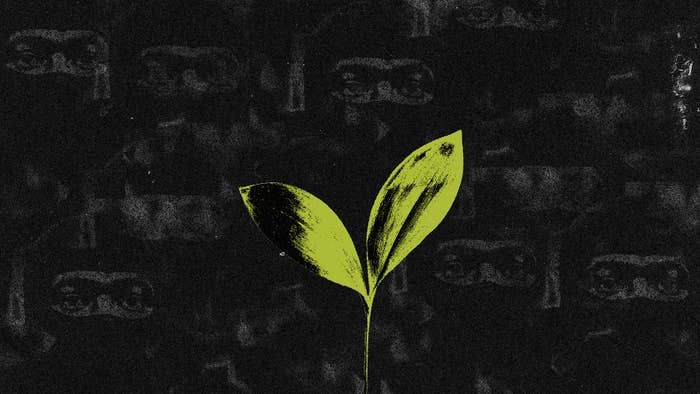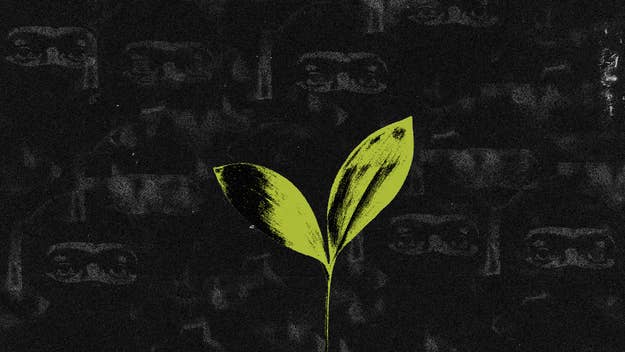
Industry plants are real.
As you’re reading this, music executives are huddled inside a conference room somewhere, plotting ways to manufacture the rise of freshly signed artists. Sometimes their plans are successful, and they’re able to use enough industry muscle (and money) to force artists onto listeners.
It’s not a new phenomenon. For decades, shady business deals went down in the backrooms of radio stations, where executives paid off DJs like Alan Freed and strong-armed their artists’ songs onto the airwaves. Now, labels have even more tricks at their disposal, including fake streams, paid social posts, and “viral” trends that are often manufactured by TikTok influencers and digital media agencies. So it’s only natural that people grew suspicious and coined a term in the early 2010s for a new artist who pops up out of nowhere, with little legitimate buzz, and is shoved down fans’ throats: an “industry plant.”
The problem is, the term has become so overused and misunderstood that it’s lost all meaning. These days, it gets used to describe any new artist who gains popularity quickly, even if there isn’t clear evidence of label trickery or deception. A young singer like PinkPantheress puts out catchy songs that ride the algorithm and go viral on TikTok? Must be an industry plant. A new rapper gets a few big co-signs from A-list artists, which leads to a spike in media coverage? Industry plant. A band strikes gold with a viral debut single that gets them booked on a late-night TV show? You guessed it. Plant emojis everywhere.
A real industry plant is an artist whose success comes from their music industry connections, rather than from artistic merit or genuine interest from fans. Think: a new artist who signs a major label deal on the low and gets fast-tracked to mainstream exposure on the back of industry resources, while still presenting themselves as independent. Or the family member of a powerful record executive, like New York drill one-hit wonder CJ, who popped up out of nowhere with a well-connected uncle at his back.
In theory, “plants” get plugged in with major opportunities like festival appearances, A-list collaborators, and mainstream press coverage before releasing music that actually connects with listeners. But now, people are rushing to throw these conspiracy theories at literally any new artist who experiences a rapid rise in popularity. Instead of coming from an understandable place of skepticism about label schemes, “industry plant” keyboard warriors are using the term as a lazy way to dismiss any hot new artist, before doing real digging into the mechanics of their rise. In 2024, most people are using the term incorrectly.
The latest artist that the industry supposedly “planted” is 4Batz, a 20-year-old Dallas singer who has become one of the most talked-about new acts with only three songs out. When his first two songs went viral, attracting co-signs from stars like Kanye and Drake, the conversation immediately shifted from the music to “industry plant” conspiracies. We’re still learning about the exact details of 4Batz’s backstory, but the tired discourse around him already proves just how overused and divorced from context the term has become.
4Batz caught fire in late 2023 with “act i: stickerz ‘99’” and “act ii: date @8.” The juxtaposition of his gritty street image with pitched-up love songs caught the attention of fans online (thanks in part to a memorable From The Block performance), igniting a viral ascension on TikTok and YouTube. Soon, he was on the radar of A-list stars, which attracted mainstream press coverage, and his shiesty-clad face was everywhere. Throughout his initial rise, 4Batz was still an independent artist who had never even set foot on an airplane, but his sudden come-up raised eyebrows and the “industry plant” accusations began.
Rather than digging into real signs of suspicious label activity, commenters came up with conspiracy theories. Complex ran a story in January called What You Need to Know About 4batz, 2024’s First Breakout Act, and the comments section of the accompanying Instagram post was full of plant emojis. “Isn't Complex legally obligated to label this as a sponsored ad? Cause that's what it comes across as,” read one comment. Some went even deeper, theorizing, “Complex has made 2 separate posts about the same dude in the last couple days, gives his whole bio like it’s a promotion, and they’re comparing him to way bigger artists like Brent. The music’s good, but no one with 2 songs is getting this much attention.”
I can tell you with certainty that those theories are incorrect. I lead the team that made the post, and it’s our job to cover new artists that people are interested in. There was no paid promotion or shady industry dealings behind the post. We covered him organically because he was blowing up with multiple viral songs (one of which had already cracked the Billboard Hot 100 chart) and his rise had become newsworthy. The bet ultimately paid off, and engagement on the post was higher than average. Fans are clearly interested in 4Batz.
A lot of the same people complaining about a lack of artist development are also complaining about “industry plants” who have simply gone through the exact kind of development that they’re asking for.
The “industry plant” chatter around 4Batz got even more intense when Drake announced a remix of “act ii: date @ 8.” “BUT HOW DID HE GET A DRAKE FEATURE WITH ONLY THREE SONGS OUT,” typed angry fans everywhere, trying to use the feature as definitive proof that he’d been planted. But if they had spent even a few minutes doing research, they would have learned that Drake has been doing this for years, jumping on remixes of viral songs from rising artists like ILoveMakonnen and Fetty Wap as a way to fuel his own career. Drake’s ability to find and collaborate with the right new artist at the right time is one of his biggest superpowers. These features help him just as much as they help the young artists.
A day after the remix came out, Billboard reported that 4Batz had freshly inked a short-term EP license deal with Drake’s OVO record label, which suggests this may not have been a label-manufactured rise after all. The “industry plant” conspiracy theory is based around the idea of label executives striking a deal with an undeveloped artist, plugging them into advantageous opportunities, and then getting rich. But 4Batz was still independent when he went viral, building up enough genuine momentum to spark a major label bidding war. At that point, he had leverage, choosing an advantageous short-term licensing deal with OVO instead of locking himself into a typical multi-album deal. Now, he’ll be in the position of having even more options after he puts out an EP and finds a label or distributor for his debut album. If 4Batz is really “the definition of an industry plant” like everyone on Twitter is theorizing, the people doing the “planting” would have already trapped him into a longterm deal.
One of the biggest pieces of “proof” that people have used about 4Batz being an industry plant is that his manager, Amber Baker, also recently worked with RCA Records as a creative manager. In an interview with Billboard, 4Batz explained that he met Baker when it came time to shoot the video for “stickerz,” because of her background with video work. She became his manager and connected him with Vydia, an audio and video distribution company for independent artists, which allowed him to release songs on his own. That sounds like a description of a manager doing exactly what a manager is supposed to do, not an evil plan to “plant” an artist against everyone’s will. And now that the OVO EP deal has happened, it’s clear that her involvement wasn’t the sign of secretive dealings with RCA, which would have been an actual sign of a plant. Why would RCA give up on their plant the moment it bore fruit?
At this point, it seems most of the 4Batz “industry plant” talk is happening simply because he blew up fast. But times have changed. The internet doesn’t work like it used to, and overnight success is no longer an automatic indication of suspicious industry activity. In the “for you page” era of social media, which is built on powerful AI algorithms, things can blow up out of nowhere and reach large audiences very quickly.
The phenomenon isn’t restricted to music. Every day, random people on the internet are going viral and reaching mass audiences overnight. Last year, a 20-year-old woman uploaded a TikTok about her father's passion project (a boating app) and the clip caught fire on the algorithm, racking up 20 million views in just days. Before long, her dad's app had skyrocketed to No. 1 on the app store and the story was picked up by CNN and the New York Times. No one in the boating community was calling him an “industry plant.” It was simply a compelling video that blew up thanks to a quirk in the algorithm. Things like this happen all the time now. Why is the conversation so different when it comes to musicians?
If it was so easy to pick a random artist and “plant” them, the industry would be doing it all the time.
Even when a new artist does have a powerful team around them, the “industry plant” conversation is usually counterproductive. For years, fans have been begging for more artist development from labels—a fair request. These days, many artists are signed as soon as they stir up a whiff of viral buzz, and labels tend to expect quick returns, so they often don’t have time for the old method of quietly developing new artists behind closed doors (setting them up with vocal coaches, choreographers, etc) before rolling them out when they’re ready. The funny thing is, a lot of the same people complaining about a lack of artist development are also complaining about “industry plants” who have simply gone through the exact kind of development that they’re asking for. Most of the time, these people are getting upset about the music industry just working properly.
If it was so easy to pick a random artist and “plant” them, the industry would be doing it all the time. Powerful executives are constantly signing new artists and deploying elaborate marketing schemes behind them, but most of them never become big stars. Even with a strong industry push at their back, artists usually still need a genuinely hot song in order to take that next step and blow up. In fact, at the same time that the “industry plant” term is getting thrown around more than ever, there’s actually a growing amount of anxiety about a lack of new stars. As hip-hop’s market share continues to dip, and the most successful acts get older, outlets like The New York Times are even beginning to ask big questions like, “Where are the new rap stars?”
There’s genuine concern about the next generation of popular music, as “old music” continues to take more market share from “new music,” so whenever an artist pops up with real star potential, we should be celebrating them for representing a glimmer of hope; not immediately tearing them down. It comes across as weirdly bitter.
As producer Sonny Digital recently tweeted, “The term ‘industry plant’ was definitely created by someone who was trying to get on in the music industry and it didn’t work out for them so now when they see someone do what they couldn’t do they have something to call them a ‘industry plant.’ Just bitter…”
Better yet, what if we focused all of this energy on the music itself? If 4Batz’s songs don’t move you, then you shouldn’t keep listening. But ignoring or dismissing him because of theories about his rise is counterproductive. It’s good to have a healthy amount of skepticism, but please stop angrily typing “industry plant” under every post of a new artist and take that time to do something more productive: listen to the music and decide whether you like it or not. In other words, tend to your own garden. You’re probably using the term wrong anyway.


